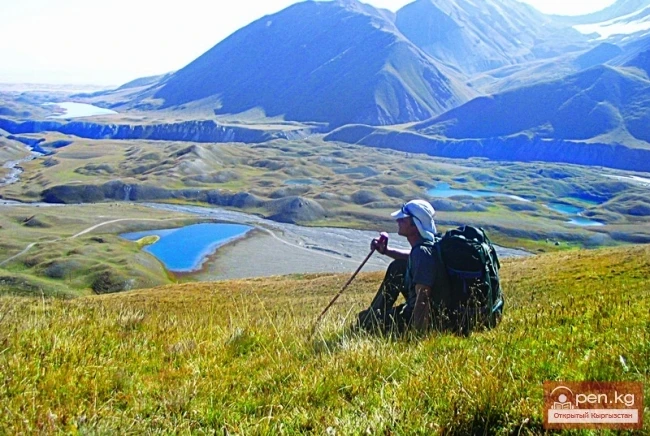Tourism — a Great Business
There are grounds for such a statement. Everyone knows how profitable, for example, the automotive industry is. But let's take France. In this country, tourism has far surpassed not only the automotive industry in terms of income but also many other modern sectors of material production and services. In general, it is hard to name a developed country where tourism does not occupy a leading position in the economy and does not contribute significantly to national income. It is also no secret that some small states manage to exist almost entirely in today's "technological" world thanks to income from tourism.
Learning from Neighbors
History sometimes holds amazing facts that are perceived with a condescending smile by subsequent generations. The field of scientific discoveries and inventions is particularly full of such cases. Here is one of those stories that seems instructive to us.
For over 150 years, Europe rode on four-wheeled bicycles when a serf craftsman named Artemov invented "his" bicycle — a two-wheeled one with square wheels covered with tin, which could be ridden by pushing off the ground with one's feet, because it lacked steering and "normal" wheels. Later, German craftsmen added a handlebar and pedals to the design, but the shape of the wheel remained in the improved model. In Germany, this marvel of engineering was literally named "bone-shaker."
It seems that the state of tourism in the republic resembles such a bone-shaker: it's painful to ride, the speed is low, but you can't just throw it away. However, there is another way: to see what "vehicles" the neighbors use. Sociological research data will help us with this.
Hunting tourism has always been popular. It is currently developing most intensively in Africa and Europe. The tiny state of Uganda in Africa, which few people may even know about, receives up to 74,000 hunters a year, bringing in a net income of about 15 million dollars. The state of Botswana has allocated 15% of its entire territory for national parks used for safaris for foreigners. An interesting point is that foreign hunters kill animals 8 times less than locals, but pay 36 times more just for licenses. And there are no problems with "selling tours."
In Europe, hunting tourism is developed by Hungary, which earns an annual profit of five and a half million dollars, Spain, which receives an income of one billion pesetas, and Yugoslavia.
Even such a brief overview allows us to note priority areas in the development of tourism worldwide. So, is it worth "inventing your own bone-shaker"?
What else do they do in the West to develop tourism, and thus to generate income? It's very simple. They expand the range of services, provide tax benefits, cheap loans, and exempt from local taxes. They develop new types of tourism for various age groups. They foster cooperation between countries in creating tourist products. Particularly noticeable is the sharp increase in various services such as the use of recreational transport: donkeys, camels, yaks, carriages, troikas, etc. It's so simple that it's wise.
In the West, even a factor that seems to limit tourist demand for recreation is taken into account. This is the income level per family member. Residents of Europe and the USA travel only when they have high incomes. In this case, it is natural that the share of long-distance travel and expensive services increases. However, income level is not always decisive when certain national traditions come into play. For Japan, for example, a paradoxical phenomenon has been noted. The Japanese even enjoy having to pay a lot. Thus, in the eyes of the owner of an expensive pleasure, their own prestige increases, and in this case, a Japanese person usually does not think about money. Of course, if they have it. But this concerns those who are not deterred by price. For us, the layers with average and even low income levels are interesting. They are characterized by a desire to spend less but see as much as possible. They will be satisfied with cheaper rooms and a sufficient, but not necessarily high, level of comfort. Moreover, for such clients, the cost of the tour decreases due to discounts on group services.
It is also noteworthy that many foreign tourist firms build their marketing strategy on attracting tourists with low prices and comprehensive services, but after arrival, they engage them with a diverse range of additional services purchased for cash. In several European countries, tourists spend 60-70% of all expenses on additional services.
It is also striking that international tourism strives for the integration of service complexes. Hotel businesses, trade, aviation, television, and advertising enterprises are concentrated in one hand, allowing for more flexible maneuvering, adapting elements of the complex to market conditions as needed.
It is not coincidental, but rather a logical consequence, that the governments of developed capitalist countries pay attention to the tourism industry. It is no coincidence that there are scientific research centers in all Western European countries, the USA, Canada, and several other countries that deal with tourism development issues. So let's take advantage of their findings and recommendations. A change in the behavior stereotypes of tourists has been noted. What are they? Firstly, there is a shift from passive information perception to acquiring direct personal experience through active participation in events and activities. Secondly, there is a rejection of "lying" on the beach in favor of active outdoor recreation combined with physical culture, sports, preventive treatment, and communication with nature.
It is time to exclaim: "Eureka!" By its nature, Kyrgyzstan is unique. Indeed, when describing the republic, words like relict, unique, one of a kind, inimitable, rare, extraordinary, and exotic are often encountered. This is not a whim of the writers. Here, it is possible to use the path of tourism development that has long been tested in the West, particularly in France.
Read also:
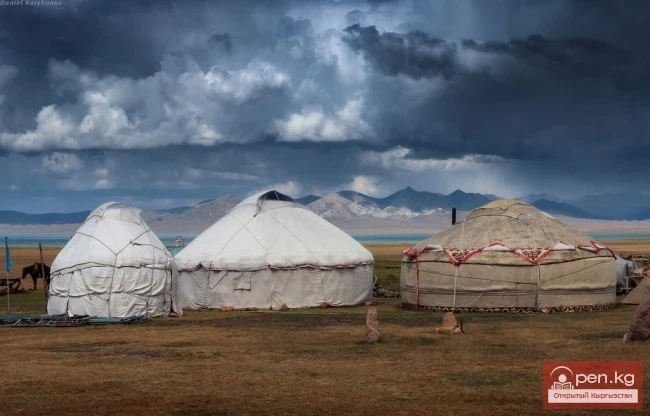
The presentation of the Regulations on the national award "KYRGYZ TOURISM AWARDS" took place.
On April 16, 2014, a press conference was held at the "Kabar" news agency regarding the...

Kyrgyzstan's Aizhamal Osmonova won the title of Miss Portrait at the Miss Tourism International beauty pageant in Malaysia.
Kyrgyzstani Aizhamal Osmonova won the title of Miss Portrait at the Miss Tourism International...

Aykol Alikjanova became the winner and titleholder of "Miss World Kyrgyzstan 2014."
Aykol Alikjanova became the winner and holder of the title "Miss World Kyrgyzstan 2014"...
The Beautiful Country Known as Kyrgyzstan
Kyrgyzstan is a small country bordering Uzbekistan, Kazakhstan, and Russia. The main attractions...

The International Business Council has developed a vision for the development of Kyrgyzstan's economy.
The International Business Council has developed a vision for the development of the Kyrgyz...

Hotels Follow the Latest Sanitary Regulations
The Leading Hotels of the World follow the latest sanitary regulations Currently, the association...

Lesser Horseshoe Bat / Kidik Taka Tumshuktyu Jarganat / Малый подковонос
Lesser Horseshoe Bat Status: Category VI, Near Threatened, NT: R. A species with a declining...

Wrapped Alpine Saw-wort
Wrapped Alpine Saw-wort Status: VU. Rare species. Found in Kyrgyzstan at the edge of its range....
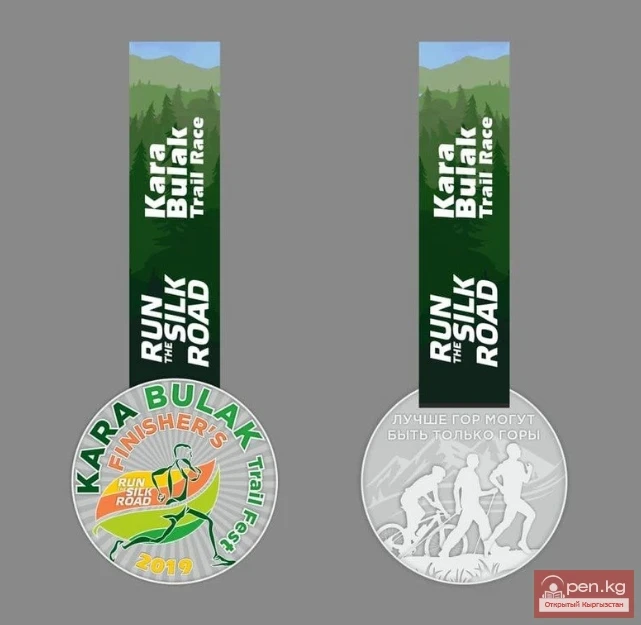
"Kara-Bulak Trail Fest" Competition
On July 6, 2019, the KARA BULAK TRAIL FEST 2019 will take place in the foothills of the Kyrgyz...
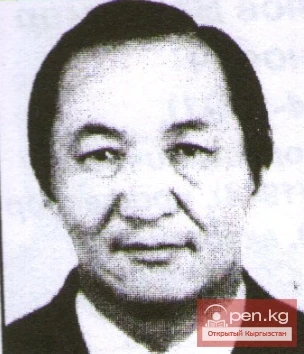
Ibraimov Abyt Ibraimovich
Ibraimov Abyt Ibraimovich (1948), Doctor of Biological Sciences (1985), Corresponding Member of...
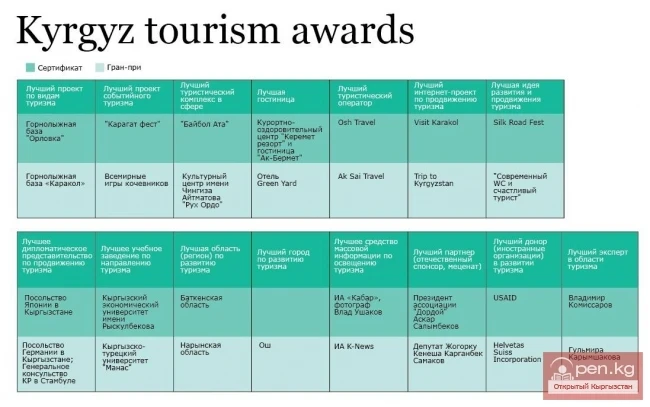
The Department of Tourism Awards the Best Tourism Projects of the Year for the First Time
The KYRGYZ TOURISM AWARDS ceremony took place at the Jannat hotel. For the first time in history,...
Two Tourists in Shallow Water -1
Source: Fifth Channel, Kyrgyzstan www.5tv.kg...
Two Tourists in Shallow Water -2
Source: Fifth Channel, Kyrgyzstan www.5tv.kg...
Two Tourists in Shallow Water -3
Source: Fifth Channel, Kyrgyzstan www.5tv.kg...
Two Tourists in Shallow Water -4
Source: Fifth Channel, Kyrgyzstan www.5tv.kg...
Two Tourists in Shallow Water -5
Source: Fifth Channel, Kyrgyzstan www.5tv.kg...
Two Tourists in Shallow Water -6
Source: Fifth Channel, Kyrgyzstan www.5tv.kg...
Two Tourists in Shallow Water -7
Source: Fifth Channel, Kyrgyzstan www.5tv.kg...
Two Tourists in Shallow Water -9
Source: Fifth Channel, Kyrgyzstan www.5tv.kg...
Two Tourists Stranded -8
Source: Fifth Channel, Kyrgyzstan www.5tv.kg...

Olga's Incavillia / Olga's Incavillia / Olga’s Chinese Trumpet-creeper
Incarvillea olgae Status: CR B2ab(iii). A very rare, critically endangered ancient species...

Tourist Area Management Program
The project "USAID Business Development Initiative" (BGI), within the tourism...

Chuya Sharp-wing / Uchtoo Kanat / Eastern Ostroluchka
Chuy Ostroluchka Status: 2 [CR: C]. Possibly already extinct in Kyrgyzstan, an endemic...
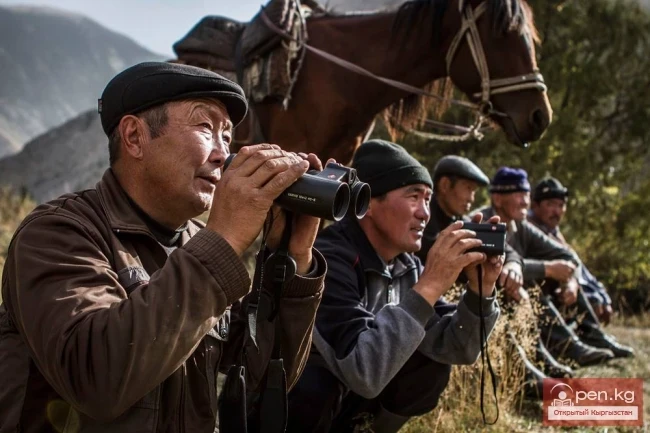
Kyrgyzstan Became the Leader of the National Geographic Tourism Ranking
Kyrgyzstan has become the undisputed leader of the National Geographic Traveler Awards 2014 in the...

KUZNETSOV Georgy Fyodorovich
KUZNETSOV Georgy Fedorovich...

Chonbasheva Cholpon Keneshovna
Chonbasheva Cholpon Keneshovna (1959), Doctor of Medical Sciences (1998) Worked as a professor at...

The film "Light-Ake" will be screened at the Museum of Modern Art in New York.
On April 7, the Museum of Modern Art in Manhattan, New York, will screen the film...

Sievers’s Apple-tree \ Kyzyl Alma \ Sievers’s Apple-tree
Sievers’s Apple-tree Status: LC category. A polymorphic species of the mountain-central Asian...

Turkestan Catfish / Turkestan Zhayany, Zhayany Fish, Lakka
Turkestan Catfish Status: 2 [VU: E]. The only representative of the genus in Kyrgyzstan....

Kyrgyzstan Included in the Top 10 Countries to Travel to in 2019 According to Lonely Planet Publishing
The authoritative international publisher Lonely Planet has included Kyrgyzstan in the list of the...

Black Stork
Black Stork Status: VI category, Near Threatened, NT: R. One of two species of the genus in the...
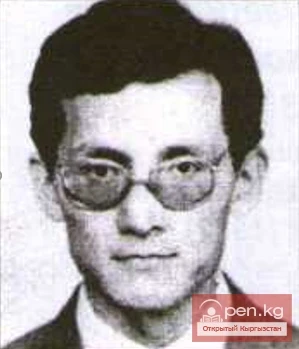
Otorbaev Joomart Kaipovich
Otorbaev Joomart Kaipovich (1955), Doctor of Physical and Mathematical Sciences (1990), Professor...
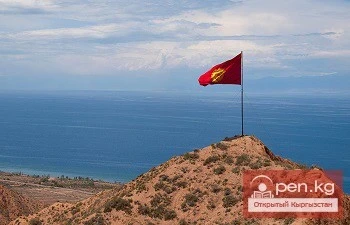
National Geographic Traveler included Kyrgyzstan in the top twenty travel destinations of 2016.
Kyrgyzstan has been included in the top twenty tourist destinations of 2016 by National Geographic...

Gurovich Viktor Tsalevich (1937)
Gurovich Viktor Tsalevich (1937), Doctor of Physical and Mathematical Sciences (1983), Professor...

Kyrgyzstan Woman Takes the Lead in Miss World 2015 Contest (Interview)
"Miss Kyrgyzstan-2015" Tatybubu Samidin kyzy has made it to the top of the "Miss...
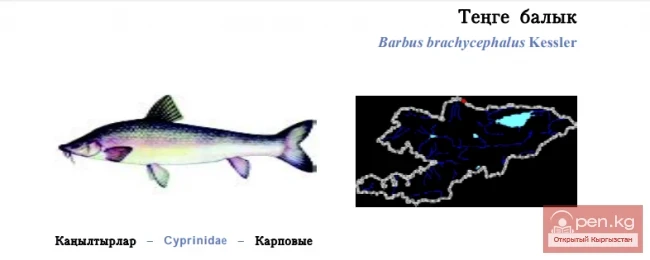
Aral Catfish / Tenge Fish / Aral Barbel
Aral Barbel Status: 2 [CR: C]. Species extinct in Kyrgyzstan....
Munarbek Seyitbek Uulu Takes 3rd Place in the World Boxing Ranking
Kyrgyzstani Munarbek Seyitbek uulu ranks 3rd in the updated world ranking according to World...

Bearded Vulture \ Kёk жору \ Lammergeier
Bearded Vulture Status: Category VI, Near Threatened, NT: R. The only representative of the genus...

Whooper Swan
Whooper Swan Status: Category VII, Least Concern, LC. Rare breeding species. One of seven species...
Ordo Sakhna Music from Kyrgyzstan of the Folk Ethnographic Theater
Ordo Sakhna – The Folk Ethnographic Theater. Biography. The folk ethnographic theater Ordo Sakhna...
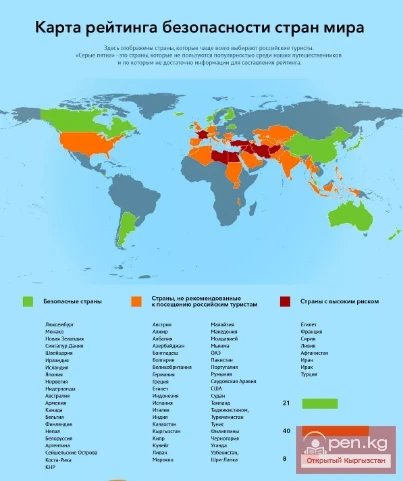
The Most Dangerous and Safe Countries for Tourists in 2020 Named
List of Favorable and Dangerous Countries for Tourism Experts from the international organization...

Eastern Sand Boa / Chygys Kumchul Muuntkuchu / Tatary Sand Boa
Eastern Sand Boa Status: Near Threatened (NT). One of 10 species of the genus, which includes...
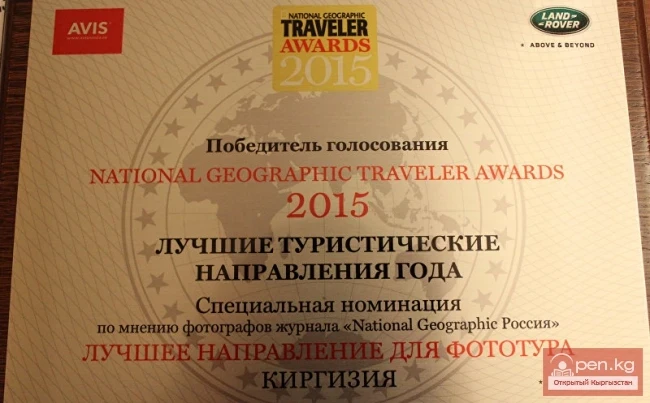
Kyrgyzstan Wins the National Geographic Traveler Contest for the Second Time
Kyrgyzstan has once again become a priority for Russian tourists. This year, the republic won in...

Alajja (Eryantera) Deviating / Kıyshyk Korum Gul / Anomalous Alajja
Anomalous Alajja (Erianthera anomala) Status: VU. Endemic to the mountains of Central Asia. A rare...
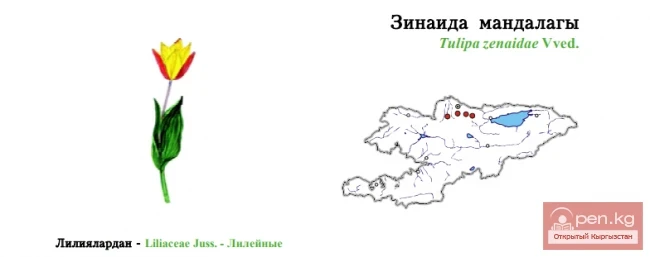
Zenaida's Tulip / Zinaida Mandala
Zenaida’s Tulip Status: VU. A narrowly endemic species of the Kyrgyz Ridge, at risk of rapidly...

Kyrgyzstan Leads in the "Wellness Tourism" Category of the National Geographic Awards
Issyk-Kul topped the top 10 resorts of the former USSR for summer vacations of Russians....

Erkin Mirsaidovich Mirrahimov
Mirrahimov Erkin Mirsaidovich (1960), Doctor of Medical Sciences (1995), Professor (1997) Uzbek....

World Economic Forum 2014-2015: Kyrgyzstan Improved Its Position by 3 Places in the GDP Ranking
Kyrgyzstan ranked 128th in terms of gross domestic product among 144 countries with $7.2 billion...
